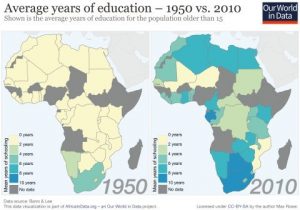In the age of the Internet, information is everywhere. One might think it is easy to be well informed on current events, however with the barrage of information via social media, or sites like reddit or news aggregators that tailor your news feed to your interests – it can be hard to get a complete picture of what is going on in the world.
Africa has been a historically underreported continent in the media. Horrific events like the Rwandan 1994 genocide saw weeks go by without adequate media coverage or foreign assistance, despite the incredibly high death toll.
The African continent has also gotten a reputation for being a giant, homogenous place where everyone is poor and starving, with nothing but bad news. So it’s coverage, especially its good news – is not worth reporting on. With inevitable cultural relativity and bias that comes with Western media reporting on Africa, it is important to understand that what we read about the African continent might not be an accurate representation all the time.

On average, people are getting more educated in Africa as time goes on. Is this the kind of news about Africa you are used to hearing?
Africa Agenda, a Denver-based non-profit held a summit to discussaccurate reporting of Africa last Friday, for a “fun and meaningful night of great discussion. Journalists, political, nonprofit and business leaders and other specialists on Africa…(will) explore the challenge of African news and craft news agendas to benefit both Africans and Americans…Drawing inspiration from the Obama Administration’s historic and highly successful 2014 U.S.-Africa Leaders’ Summit, Africa Agenda believes that African communities need to work with their counterparts around the world to foster understanding that strengthens the foundations of a purposeful African continent.
This year–after the leaders of Ethiopia and Eritrea met in July following 22 years of rivalry between the two countries – many said it was a historic moment. When the nation of Ghana produced a stream of consistent positive developments, including appearing in the top ranks of the 2018 World Press Freedom index, many said Ghana had crossed the mark.
Yet…the news was drowned out because U.S. President Donald Trumphad denigrated ALL African nations as ‘s##holes’. Except for a few complaints, nothing was done to deal with the lingering falsehoods about an entire continent” – Africa Agenda
It is important to remain informed of Africa’s triumphs and tribulations. It’s not all bad, and it’s not all good, but it is a continent that is diverse and huge. Over 1 billion people call Africa home.
“Immigration to the US from Africa has grown steadily in the past four decades, according to the Census, especially from 2008 to 2012. Today, there are over 1.6 million African-born immigrants living in the US, up from just 80,000 in 1970. Aurora (Colorado) has seen a steady spike in the number of Africa-born residents.
In the 2010 Census, more than 8,000 Aurora residents were born in Africa. (Aurora) is a central hub of Colorado’s African community, with more than one third of the state’s African immigrants calling Aurora home. The African-born population is also Aurora’s fastest growing immigrant group, growing faster in that decade than immigrants from Latin America or Asia. The Census report also said immigrants from Africa had more education than most immigrants — 41 percent had a bachelor’s degree or higher compared with 28 percent of immigrants overall” – Sentinel Colorado.
The overlap between Africa and the United States very much exists, and issues in Africa like women’s rights, LGTBQ rights, xenophobia and politics draw some interesting parallels to the USA. In many ways, we are not so different at all. The information we receive about Africa shapes the way we look at the continent – from African immigrants we know, to policies we support or products we buy.
We recommend adjusting the news you get on your phone/social media to include African coverage from credible sources. You can follow African news groups on Facebook, subscribe to r/Africa on Reddit, head over the Africa BBC news section or check out Africanews.com.
Lastly, we would love to know where you get your news from. Does it include Africa?
AuthorNatalie AberPosted onNovember 6, 2018CategoriesUncategorizedEdit”Hey Colorado, where do you get your African news from?”
